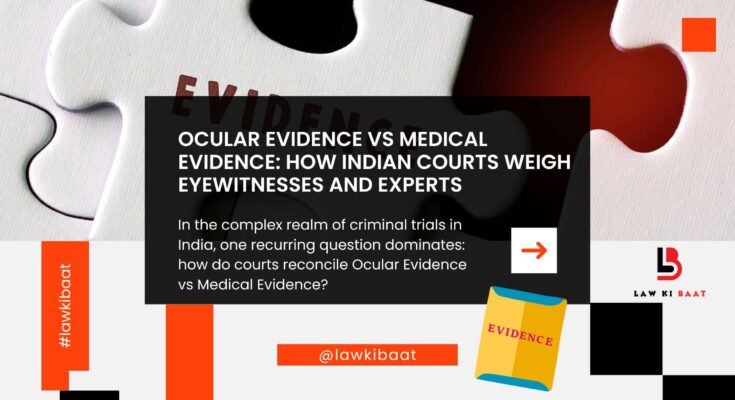In the complex realm of criminal trials in India, one recurring question dominates: how do courts reconcile Ocular Evidence vs Medical Evidence? In cases where a witness narrates the sequence of events and a doctor or forensic expert presents a scientific report, conflicts may arise. Which should the court believe? Ocular Evidence vs Medical Evidence is not just a procedural query but a deeply legal conundrum affecting the fate of countless criminal trials.
In this blog by Law ki Baat, we will explore the nuances of Ocular Evidence vs Medical Evidence, referencing key judgments, understanding legal interpretations under the Indian Evidence Act, and examining when and how Indian courts prioritize one over the other.
🧠 What is Ocular Evidence in Law?
The term “ocular evidence” refers to eyewitness testimony, that is, what a person has seen and is narrating before the court under oath. This falls under Section 60 of the Indian Evidence Act, which deals with direct evidence.
When someone asks, what is ocular evidence in law, it’s crucial to understand that such evidence is based on human perception, memory, and credibility. The credibility of witnesses becomes paramount, and courts usually prefer direct vs indirect evidence when it comes to criminal conviction.
🔬 Meaning of Medical Evidence in Court
Medical evidence, on the other hand, includes the findings of doctors, pathologists, forensic experts, or any medical expert opinion which is relevant to the crime in question. These may involve:
- Postmortem reports
- Injury report examinations
- Cause of death analysis
- Toxicology reports
- Psychological evaluations
This type of evidence is generally corroborative, aiming to support or question the reliability of the ocular account.
People frequently ask: what is the meaning of medical evidence in court? It’s essentially forensic evidence or medically derived insights presented by experts under Section 45 of the Indian Evidence Act, which covers expert opinion.
⚖️ The Difference Between Ocular and Medical Evidence
When discussing Ocular Evidence vs Medical Evidence, the primary difference lies in:
| Basis | Ocular Evidence | Medical Evidence |
| Nature | Human testimony | Scientific analysis |
| Source | Witness present at the scene | Medical expert / Forensic lab |
| Legal Section | Section 60, Indian Evidence Act | Section 45, Indian Evidence Act |
| Purpose | Narrate facts seen | Interpret cause/effect scientifically |
| Susceptibility | Subject to memory and bias | Subject to procedural error or assumptions |
This distinction raises an important user search: which is more reliable: ocular or medical evidence? The answer is: it depends.
🧑⚖️ Supreme Court on Ocular Evidence vs Medical Evidence
One of the most common Google searches is: supreme court case ocular vs medical evidence. Let’s examine a few landmark decisions.
🏛 Prithviraj Jayantibhai Vanol v. Dinesh Dayabhai Vala (2021)
The Supreme Court held that ocular evidence must be given primacy unless the medical evidence completely rules out the possibility of the eyewitness account.
🏛 Darbara Singh v. State of Punjab (2012)
It was held that medical expert opinions are advisory in nature, and unless they completely contradict the eyewitness testimony, courts should prefer direct testimony.
🏛 Ram Narain Singh v. State of Punjab (1975)
Here, the Court emphasized that when there’s a glaring inconsistency, and the medical report makes the eyewitness version impossible, the ocular evidence can be disbelieved.
👁️ Can Medical Evidence Override Eyewitness Testimony?
One burning question from users is: can medical evidence override eyewitness testimony?
The answer is yes, but only in rare situations. When a medical report shows that the injury claimed by a witness could not have occurred the way it was described, courts can disregard ocular evidence.
For example, if a witness says the victim was shot from behind but the autopsy shows a front-entry wound, that contradiction may raise doubts about the reliability of witness statement.
🩺 How Do Courts Evaluate Ocular Evidence?
If you’re wondering how do courts evaluate ocular evidence, the answer lies in a balance of credibility, consistency, and context:
- Consistency in witness statement
- Lack of contradiction in testimony
- Absence of bias or animosity
- Cross-examination outcome
The courts also check whether the eyewitness testimony aligns with other prosecution evidence.
🏥 Role of Medical Expert in Criminal Case
The role of medical expert in criminal case is critical. Experts help the court:
- Verify cause of death
- Examine injury nature
- Determine the time of death
- Assess trauma, poisoning, or assault evidence
Although medical opinions are secondary evidence, they add scientific credibility to the narrative and assist judges in drawing accurate inferences.
👨⚖️ Is Eyewitness Testimony Enough for Conviction?
A question often debated in law schools is: is eyewitness testimony enough for conviction?
Yes, courts have consistently held that conviction can be based solely on ocular evidence if it is credible, consistent, and corroborated by circumstantial details. But if there’s any material contradiction, especially exposed by medical jurisprudence, conviction may be set aside.
❌ When Does Medical Evidence Contradict Ocular Evidence?
One of the key points in the Ocular Evidence vs Medical Evidence debate is determining when does medical evidence contradict ocular evidence.
Typical situations:
- Eyewitness says multiple stab wounds; autopsy shows only one
- Witness says head injury; medical expert says no signs of trauma
- Cause of death stated as hanging; forensic report says strangulation
In such cases, courts must decide which evidence has greater legal admissibility and whether the contradiction is “material” or explainable.
📜 Ocular Evidence in Indian Evidence Act
The Indian Evidence Act gives clear weight to ocular evidence under:
- Section 60: Oral evidence must be direct.
- Section 3: Defines “proved” based on the judge’s belief in truth.
- Section 114(g): Courts may presume that a man who is able to provide evidence and does not do so, is suppressing the truth.
This legal architecture favors direct testimony, making ocular evidence in Indian Evidence Act highly valued—unless proven false or improbable.
🧪 Importance of Forensic Evidence in Trials
In recent times, the importance of forensic evidence in trials has skyrocketed with technological advancements.
Some examples of medical evidence in criminal cases include:
- DNA testing
- Ballistic reports
- Blood group matching
- Fingerprint analysis
- Toxicology screens
These reports play a huge role in injury report examination and establishing links between accused, crime scene, and victim.
📝 Is Medical Report Enough to Prove Injury?
Another frequent query: is medical report enough to prove injury?
Yes, in civil cases or minor criminal offences, a medical report is often sufficient. However, in serious offences like murder or rape, the report must corroborate the ocular account to be conclusive.
⚖️ Can Court Ignore Medical Opinion in Favor of Witness?
Can court ignore medical opinion in favor of witness? Absolutely—if the witness is credible and consistent, courts often disregard minor inconsistencies raised by medical reports.
But if the contradiction goes to the root of the prosecution’s case, then courts have no choice but to question the credibility of witnesses.
🧬 Medical Jurisprudence: An Evolving Field
Medical jurisprudence, the intersection of law and medicine, is evolving fast. Indian courts are slowly embracing scientific methods in criminal trials. In cases involving rape, homicide, poisoning, and torture, courts now demand more than just oral testimony—they want proof, precision, and science.
🔄 Direct vs Indirect Evidence: Who Wins?
In the tug-of-war between direct vs indirect evidence, courts lean toward:
- Direct/Ocular if the witness is unimpeachable
- Medical/Indirect if the witness is untrustworthy or the account is improbable
Ultimately, the burden of proof lies on the prosecution to prove guilt beyond reasonable doubt, which may require both forms of evidence to align.
🔍 Cross-Examination of Medical Expert
During trials, the cross-examination of medical expert often becomes pivotal. Defense lawyers aim to:
- Highlight inconsistencies
- Show lack of conclusiveness
- Question qualifications or assumptions
- Suggest alternate cause of injury/death
This cross-examination affects the legal admissibility of evidence and sometimes tilts the case in favor of the accused.
🏁 Conclusion: A Balanced View of Ocular Evidence vs Medical Evidence
To sum up, the debate on Ocular Evidence vs Medical Evidence is not about which is superior, but how both interact within the Indian legal system.
✅ Eyewitness testimony is trusted, but not blindly. ✅ Medical expert opinion is vital, but not sacrosanct. ✅ Both must pass the test of consistency, credibility, and corroboration.
Courts aim to ensure justice—not just legal formality, and hence every case is judged on its facts, evidence, and interpretation.
📢 Law ki Baat Can Help You Understand More
If you’re confused about how Ocular Evidence vs Medical Evidence may affect your legal case, reach out to Law ki Baat. We break down complex legal issues in simple terms.




